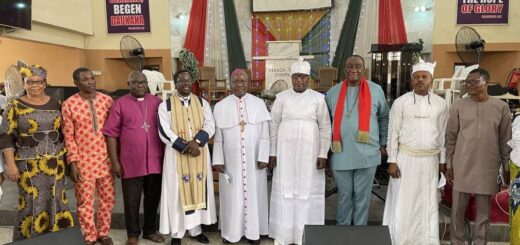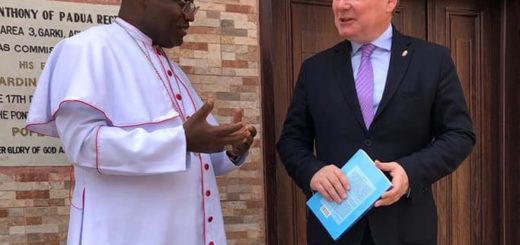Cleansing the temple of our hearts
by ARCH BISHOP · March 3, 2024
3rd Sunday of Lent, Year B, 3rd March, 2024, St. Anthony’s Parish, Yangoji. Homily by Archbishop I. A. Kaigama.
Readings: Ex. 20:1-17; 1 Cor. 1:22-25; Jn. 2:13-25
Cleansing the temple of our hearts
Peace be with you. Since the arrival of your new parish priest, Rev. Fr. Nicholas Ekemann, who succeeded your former parish priest who was kidnapped and released after many days of being in captivity, this is my first official pastoral visit to you my dear parishioners of St. Anthony’s Parish, Yangoji. Despite the difficult times and security challenges, you have continued to wax stronger in the Catholic faith. This is what it means to be a people of faith, a people of hope determined to continue, and not even death will be able to separate you from the love of God in Christ Jesus our Lord (cf. Rom. 8:38-39).
The first reading presents the Ten Commandments of God to us as our compass to heaven. In a society without laws, chaos reigns supreme. For instance, imagine if killing of a fellow human was legal, life will have no value anymore. Even though there are laws guiding and protecting human life and dignity in Nigeria, some perpetrators of evil still find it as a thing of joy to kill others without the slightest compunction, people created in the image and likeness God (cf. Gen. 1:27). God says, “do not kill” (Ex. 20:13).
The first four Commandments require us to show reverence to God, reverence for His Holy Name, observing the Sabbath and respect for our parents. The remaining commandments direct us to respect life, preserve bodily purity, respect marriage bonds, respect the property of others, respect their good name, and respect our neighbour’s wife and property. All these Jesus summarized as love of God and love of neighbour. Whenever we go for sacramental confession, we should always examine our consciences in relation to the Ten Commandments and the good deeds expected of us.
In the Gospel reading, Jesus filled with righteous anger drives out the money changers and merchants who were profaning the house of God, defiling God’s sanctuary. This act of Jesus reveals that there were people who went to the temple but had no true devotion to God. Just as Jesus cleansed the temple, the physical edifice, we too must strive to cleanse our hearts and minds of anything that hinders our relationship with God and make room for God’s presence in our lives, because we are the temples of the Holy Spirit (cf. 1 Cor. 6:19).
Jesus righteous anger teaches us that God may be merciful, but His stance for the right thing to be done never changes. We are not expected to be silent or indifferent while things go wrong in our homes, offices, and wherever else.
At the heart of the Church and our faith is the Cross, considered a scandal or stumbling block, and foolishness by the Jews and by the Gentiles. We Christians respect the Church as a house of God and not a business centre, not a commercial company, not a family inheritance or where deceit or empty promises take place.
There are several things that Jesus frowns at today both in the Church and in the wider society. Like Jesus overturned the tables of the money changers, so does he frown at the needless inflation table of Nigeria and the attendant hunger and deprivation. Jesus also frowns at some houses of prayer in Nigeria which have become business centres where the emphasis by their founders is material acquisition rather than eternal salvation.
Jesus also frowns at the corrupt economic practices in our country: the mismanagement of funds, embezzlement of public wealth and the widening gap between the rich and the poor, coupled with the worsening economic situation which continues to make life unbearable for ordinary Nigerians.
Jesus frowns at indecent dressing by some Christians who come to Church as if they are coming to a theatre show. They wear very skimpy dresses, shoes that make them walk awkwardly, transparent dresses that reveal what they are wearing under, some leave half of their upper chest half uncovered; men also wear dresses that they would not wear if President Tinubu called them to go and visit him. Many, while in Church get lost in the use of their mobile phones. Even if as some claim the sermon is not exciting why not just be still and just experience the holy presence of God. Some church goers want drama in the church, sermons that concentrate on prosperity and miracles. Some pastors who are more of motivational speakers than “men/women of God,” capitalize on this to push people to do unimaginable things, such as a pastor telling a woman not to listen to her husband; to do strange things such as standing naked at midnight to pray or visiting a grave at night claiming it is what the Lord has said. Many self-made pastors have separated families by introducing division such as when they speak emphatically that one wants to kill the other or the children and sometimes cause the woman to transfer her trust to the person of the pastor. Many are beneficiaries of lucrative pecuniary advantages which explain why we are witnessing increasingly prophesying-pastors, vision-seeing, or tongue-speaking men of God, who are more obstacles, a stumbling block to eternal salvation.
Jesus also frowns at those who attack innocent citizens for sentimental tribal or religious zeal as witnessed in different parts of Nigeria. When somebody is alleged to have publicly called for the killing of a Nigerian because of her faith and nothing is done by those who should take action, one wonders what kind of a country we are.
Lord, have mercy! May this season of Lent transform our lives as Christians, transform Nigeria as a nation, and those evil planners or doers among us in the name of Jesus Christ our Lord.




